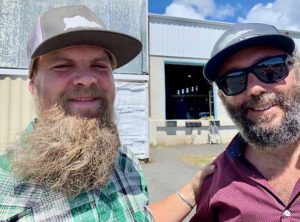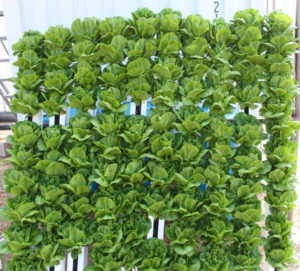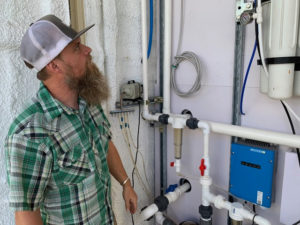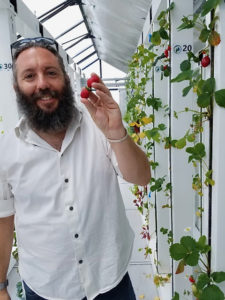
A few forward-thinking folks have set up an organic farm in a shipping container in the William D. Roebuck Industrial Park on St. Croix.
Called FarmPod, the operation has a patent pending; the partners consider their project the “future of farming.”

“My goal is to have affordable, sustainable food production available to everybody,” said Mike Straight, FarmPod founder and chief executive officer.
He’s talking fresh, flavorful, non-GMO, pesticide-free foods that go “from pod to table.”
His 20-foot container with a greenhouse on top, a working model, is a vertical aquaponic farming system capable of producing 100 pounds of fresh produce a week, according to the FarmPod website, farminapod.com.
Automated and off the grid, the pod leaves a small footprint. Sunshine generates electricity for air-conditioning in hot climates and heats water in colder ones; a computer monitors the works, alerting FarmPod owners via a smartphone application of any action needed.
“We want our customers to focus on the fun stuff, like planting and harvesting,” Straight said. “We make farming easy.”
Straight and his business partner, Beecher Cotton, are fine tuning the operation. They raise toxin-free fish in tanks inside the container and grow herbs, fruits, and vegetables on the second story. They are tweaking the system as they go: Cotton explores and tests for ideal construction materials and fabricates the parts that need to be custom made. Straight, long a tech expert, perfects computer operations and searches for the finest organic and non-GMO seeds available, especially heirloom seeds.
“The point is to find the older, traditional seeds that have not been modified and produce more flavorful foods closer to the original varieties,” Straight said, citing heirloom tomatoes as a prime example.
He grows sundry herbs, looking for intriguing flavors and searches for the best seeds for foods that schools and churches need most. He has offered chefs unusual herbs such as shiso, a Japanese plant in the mint family that has a “citrusy cumin” flavor and is used for sushi.

FarmPod also provides basil to Leatherback Brewery for one of its beers and for Win’s bush tea.
“Right now, we are giving plants to restaurants as an outreach,” Straight said. “We are starting the dialogue with them.”
While industrial agriculture may use chemical fertilizers and pesticides and often ship far afield, FarmPod farming favors the natural approach. Harvests stay close to home.
“The giant farms are polluting the environment,” Straight said.
Mass-produced foods lose nutrients and flavor during transport, and while sitting in storage, on store shelves, or in refrigerators. By the time those fruits and vegetables reach the table, they have passed their prime, Straight said.

To prove the value of pod to table, he picked a juicy strawberry and offered it for tasting.
He and Cotton, chief engineering officer at FarmPod, plan to manufacture FarmPods in the Industrial Park. They envision making 112 pods a year and delivering them from St. Croix to customers worldwide.
With four employees on island, one in California, and four in Santa Fe, which is home to the first and only other FarmPod, the company plans to hire 14 more workers when the factory opens in about two months. They will need a sales team, as well. Down the line, the factory could employ between 70 and 100 people on St. Croix. That’s the goal.
Although FarmPod has never advertised, word has spread. So far, 144 churches, schools, farmers, resorts, restaurants, and hospitals across the globe have pre-ordered pods. The initial 20 pods will stay on St. Croix or go to neighboring islands; Sejah Farm of the Virgin Islands will get one of the first three, Straight said.
It takes five weeks from the day the pod arrives at a customer’s door until the first harvest.

“We deliver a pod, you set it up within three days, plant the seeds within the first 11 days and have your first harvest in about a month,” Straight said.
He and Cotton designed the pod so that two people can assemble it with the help of two sawhorses and access to small power tools. Easy, no forklift required.
Here’s how it works: You put the seeds in biodegradable, compostable grow plugs and then set the plugs into a vertical tower in the container’s greenhouse. Each tower can take eight to 20 plants, depending on the size of the plant. Basil and mint grow into huge plants, for example. Tomatoes hang just as they would when planted in the ground.
The basil can last up to eight or nine months, Cotton noted.
In the container at the Industrial Park, Straight and Cotton are raising tilapia and a large Australian red claw crayfish. They will add catfish, koi, more crawfish, and barramundi, another name for Asian sea bass.
Their system filters out the larger bits of fish waste and then pumps the remaining water and waste up to the greenhouse. It then seeps back down through the vertical towers, fertilizing the plants before moving back into the fish tanks.
They add a smidgen of iron and some organic liquid seaweed extract to the tanks, a natural nutrient load for the fish.

While both farming methods are soil free, aquaponics uses a live source, the fish, whose waste is naturally treated and becomes a nutrient-rich food for the plants. Hydroponics, by contrast, starts with sterile water to which you add chemicals and nutrients. You later flush out the chemically treated water.
“The disposal of those chemicals lead to algae bloom and ocean acidification,” Cotton said.
When they encountered white flies in their kale, Straight and Cotton bought 1,000 lady bugs that took care of the problem.
“We don’t use pesticides,” said Cotton.
“You can buy lots of chemicals or you can purchase six dollars worth of lady bugs,” Straight added.
FarmPod began when Straight had a “weird dream” five years ago and called Cotton, his friend since they were 20 and both living in Massachusetts.
“I’m a physical engineer and a filmmaker,” Cotton said. “But I need a true tangible connection to things and have always done stuff like construction and engineering. Film is in a can.”
Cotton jumped onboard and became not only partner but also chief engineering officer.
“That’s just a fancy way of saying I build stuff,” he said.
The two keep experimenting with plant varieties. They want to hand over the pods to customers and say “this is your optimal approach.” They will offer tips and continued interaction with their customers, they said.
“Living here has informed our decisions about FarmPod,” said Cotton. “At first we asked ourselves ‘how do we make something that can withstand a hurricane?’ Now we ask ourselves how we make can something that we can take down quickly.”
Although Straight and Cotton had originally decided to manufacture FarmPods in Miami, they liked St. Croix’s smaller community. Straight had been coming to the island since he was 10, visiting his grandmother here. When he returned a few years ago, he began to wonder … does St. Croix have a port?
He wondered if the island had skilled laborers.
Well, yes, he reminded himself, how about all those who worked at the refinery?
“Finally I wondered if we could find industrial space for a factory here,” Straight said and gestured broadly to the large Industrial Park around him.
FarmPod tours are available on Mondays.






It would be hard to call anything organic these days with all the heavy metals the U.S. Military is spraying in our skies that ends up in our soil, water and air, and all of it is harming our agriculture and us!